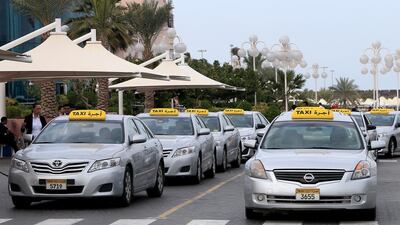ABU DHABI // Many taxi drivers complain about working up to 15 hours a day but they refuse to work under a day shift-night shift system, says the head of Abu Dhabi's taxi regulator.
"We don't understand them at all," said Mohammed Al Qamzi, the general manager of the Centre for Regulation of Transport by Hire Cars (TransAD). "Franchise taxi companies are having problems with their drivers as they don't want to work under the dual-shift system."
Under that system, one taxi is used by two drivers, each working a 12-hour shift.
“If you factor in the time spent in the car wash and handover to another driver, then they don’t have to work 12 hours,” he said. “Why are they complaining?”
Last month, the Roads and Transport Authority in Dubai said it would review working time for taxi drivers following reports that they were working dangerously long hours.
“The labour contract ensures the drivers’ rights,” Mr Al Qamzi said. “If their company starts imposing something else, the driver can come and talk to us.”
The maximum prescribed working hours for UAE employees, including taxi drivers, is eight hours. They are also entitled to a weekly day off, he said.
“Based on records, some drivers make Dh600 to Dh700 a day, while some make Dh100,” he said. “Where is the problem now – is it with the driver or the company?”
Some drivers prefer to work only during peak hours when demand for taxis is high, Mr Al Qamzi said.
Arabia Taxi, which has 1,650 drivers, monitors its drivers’ working hours.
“The car may be with the driver for 24 hours, but he may be working less than eight hours,” said Meeran Raja Ibrahim, general manager of Arabia Taxi. “It’s not true they’re working 13 to 14 hours. If a driver says he works for 12 hours, he must be earning huge money – probably Dh7,000 to Dh8,000 as a commission itself. Generally, it’s difficult for them to reach Dh5,000, seeing the way they work.
“Long working hours are not imposed by the company. That much I can tell you.”
It all boils down to drivers’ culture, attitudes and working habits, Mr Al Qamzi said.
Last June, TransAD told six franchise companies that 40 per cent of their fleets must be dual shift. However, a two-shift system means companies must hire more drivers. There are 10,000 in the emirate.
“The companies should be happy because they’ll be earning more money,” Mr Al Qamzi said. “But they don’t want to lose some of their best drivers.”
Arabia Taxi has recently started the dual-shift system, but drivers are not keen to share their cabs with others, Mr Ibrahim said.
Mahendra Limbu Lingden, 34, a driver for Arabia Taxi, said he spends about 13 hours each day in a single-shift cab. He takes breaks of five to 30 minutes.
“We need to meet a Dh426 daily target so we need to work long hours,” he said. “My friend, who normally works more than 15 hours, earned Dh5,100 last month.”
With the exception of airport taxi drivers who earn a fixed salary, the rest work on commission.
“It’s difficult to offer drivers a fixed income since franchise companies cannot monitor all of them,” Mr Al Qamzi said.
“How will you provide them an incentive? For airport taxi drivers, there’s no real incentive for them to drive back to the airport after dropping a customer. He’ll have dinner, stop at the petrol station and will not rush.”
rruiz@thenational.ae

